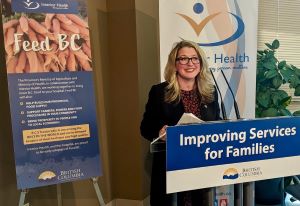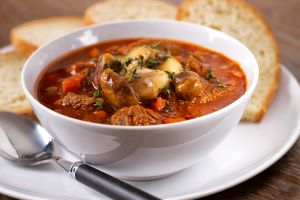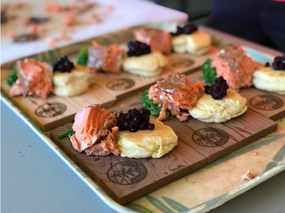Feed BC in health care
In collaboration with B.C. health authorities, the Ministry of Agriculture and Food and the Ministry of Health are working together to bring more B.C. food to B.C. hospitals and other health care facilities through Feed BC. By using B.C. ingredients, health care facilities improve the patient experience while supporting B.C. farmers, fishers and food and beverage processors to build the provincial food supply and bring local foods to patients and other health care facility clients.
Food expenditures in B.C.’s health sector
B.C.’s health authorities have been long-time champions of local food and have been working to optimize their use of B.C. food for several years with good results. To support Feed BC, the Ministry of Health directed all health authorities to track their annual B.C. food expenditures towards Feed BC’s early aspirational target of 30% starting in the 2018/19 fiscal year. The annual reports detail their hard work and determination in supporting B.C.’s farmers, fishers, ranchers, and food processors.
- B.C. Food Expenditures in Health Care 2023/24 (PDF, 333, KB)
- B.C. Food Expenditures in Health Care 2022/23 (PDF, 322 KB)
- B.C. Food Expenditures in Health Care 2021/22 (PDF, 427 KB)
- B.C. Food Expenditures in Health Care 2020/21 (PDF, 277 KB)
- B.C. Food Expenditures in Health Care 2019/20 (PDF, 280 KB)
- B.C. Food Expenditures in Health Care 2018/19 (PDF, 240 KB)
Feed BC partnerships in health care
Feed BC in Fraser Health
On January 29, 2020, the Minister of Agriculture and Food visited Baillie House, a long-term care home in Maple Ridge, to announce the Feed BC institutional partnership with Fraser Health facilities.
- Fraser Health prepares nearly 5 million meals a year for patients and residents in hospitals and care facilities.
- Fraser Health has been working for several years to increase B.C. food use in their hospitals and care facilities while ensuring all food complies with high standards for nutrition and safety.
- Fraser Health has introduced more seasonal fresh fruit and salad choices; purchased B.C. baked scones, loaves and cookies; switched to a B.C. meat supplier and egg producer; and switched to a B.C. processer of fruit juices.
Some of Fraser Health’s early Feed BC efforts: Patients enjoying pumpkin muffins in the fall and maple walnut muffins in winter from B.C. bakeries, and B.C. blueberries in yogurt berry parfaits and blueberry cake in the summer. B.C.-grown mushrooms are highlighted in Fraser Health’s cream of mushroom soup.

Feed BC in Interior Health
On March 8, 2019, Lana Popham, B.C. Minister of Agriculture and Food, visited the Penticton Regional Hospital’s production kitchen to announce the launch of Feed BC in Interior Health facilities.

- Since that time Interior Health has made significant progress to include more B.C. foods on the menu:
- Whole eggs from B.C.
- Beef ground in B.C.
- Tomatoes and peppers from the Okanagan.
- Interior Health prepares over 5 million meals a year for patients, families and individuals in need in the community.
- Interior Health is working closely with its food distributors and suppliers to source more B.C. food and meet the high food safety and nutrition standards required for health care food services.
- Interior Health has hired an executive chef who is seeking out new opportunities to use more B.C. ingredients. The chef has created a new fall/winter menu for all Interior Health facilities that features seasonal and B.C. food.
- Over 1.6 million entrée portions are made each year in the production kitchen at Vernon Jubilee Hospital for patients and residents across Interior Health. This food complements other food made on-site at all Interior Health facilities.
To highlight B.C. foods, Interior Health created a beef stew using locally grown carrots, onions and squash. “This mix of fresh vegetables matched with the flavourful, melt-in-your-mouth beef has a rich creamy flavoured sauce to tie it all together,” says Curtis Langford, executive chef. Interior Health is also pleased to serve its baked ham and cheese frittata, which incorporates B.C. milk and eggs with local ham from Helmut’s Sausage Kitchen, a Vernon-based company providing artisan meats and charcuterie.

Feed BC in Northern Health
On September 21, 2020, Feed BC in health care was officially launched in Northern Health.
- Northern Health operates 27 hospitals and care facilities serving over 1.9 million meals per year to patients and residents.
- Northern Health is committed to supporting B.C. producers and processors and serving more B.C. foods to patients and residents, like frozen vegetables and berries, cheese and chicken.
- Northern Health has partnered with Interior Health to purchase entrees prepared in Interior Health production kitchens rather than sourcing these entrees from non-B.C. companies. These entrees are used where on-site preparation is not possible.
B.C. products are found in blueberry muffins, braised red cabbage and apple, cabbage borscht, and chicken souvlaki. Many sites in B.C.’s northwest and northern interior use B.C. eggs in new menu items like garden vegetable or spinach and ricotta bakes, and broccoli and cheese quiches.

Feed BC in Vancouver Coastal Health / Providence Health Care
Vancouver Coastal Health and Providence Health Care are working with food service companies Sodexo and Compass Marquise to help bring more B.C. foods to their patients, residents and facilities through a Feed BC in Health Care Partnership with the Province.
- Together, they provide 1.6 million meals per year in 33 facilities in Vancouver, Richmond, North and West Vancouver, and along the Sea-to-Sky Highway, Sunshine Coast and B.C.’s Central Coast. These include large urban hospitals, like St Paul’s and Vancouver General, and small community facilities, like Totem Lodge and Shorncliffe Residence, on the Sunshine Coast.
- Vancouver Coastal Health and Providence Health Care use a variety of B.C. -produced or processed products in their facilities, like eggs and milk; Fraser Valley mushrooms, potatoes, beets and squash; baked goods from a bakery in Delta; tofu from East Vancouver and plant-based milks from Delta food processor.
- Serving locally produced food is an extension of Vancouver Coast Health and Providence Health Care’s commitment to provide the best care and culturally safe culinary options for patients, clients and communities throughout their region.

Feed BC in Island Health
Patients and residents in hospitals and long-term care homes on Vancouver Island are being served meals with an increasing bounty of local food as a result of the Province’s Feed BC in Health Care partnership with Island Health.
- Island Health serves more than four million meals each year to patients and residents in 28 hospitals and long-term care homes across Vancouver Island.
- Island Health has been working for several years to increase Vancouver Island and B.C. foods in their hospitals and long-term care homes.
- In 2019, Island Health developed a multi-year pilot project and engaged Islands West and the Island Vegetable Co-op Association to serve more Island-grown produce in several long-term care homes. This project reaches long-term care homes in Chemainus, Parksville, Qualicum Beach, Cumberland and Campbell River. Local family farms provide fresh produce, including Saanich’s Galey Farms and Michell Farms in Saanichton.
- Island Health has also created new recipes for patients and residents using local Island produce including potato salad, roasted nugget potatoes (potatoes); maple glazed carrots (carrots); borscht, orange glazed beets (beets); coleslaw, braised red cabbage (cabbage); and chocolate zucchini bread (zucchini).

- Other B.C.-based food supplying Island Health include B.C.-raised and Vancouver Island- processed turkey and chicken, Island-processed stew beef, and Lower Mainland shell eggs, baked goods, and dairy products.
Feed BC in Provincial Health Services Authority
Provincial Health Services Authority facilities are bringing more local food to their patients and residents, in collaboration with the Province’s Feed BC in Health Care Partnership.
- Provincial Health Services Authority (PHSA) oversees food services at six facilities: BC Women’s Hospital, BC Children’s Hospital, BC Cancer and Brock Fahrni Pavilion, in Vancouver; and the Forensic Psychiatric Hospital and the Red Fish Healing Centre for Mental Health and Addiction in Coquitlam.
- The B.C. Forensic Psychiatric Hospital has developed a partnership with Okanagan Select, an Indigenous fishery owned and operated by the Syilx (Okanagan Nation Alliance), to source B.C.-caught and processed sockeye and chinook for patients. Introducing salmon and other menu items helps maintain connection for some Indigenous and other patients with cultural food interests and preferences, and supports B.C. fishers, producers and processors.
- For National Indigenous Peoples Day in 2021, the Forensic Psychiatric Hospital developed a menu featuring traditional B.C. foods and Indigenous recipes. The menu included salmon smoked in-house and candied salmon from the Okanagan Nation Alliance, bannock made using a recipe from one of their Indigenous patients, huckleberry and Saskatoon berry compote and marinated seaweed, all served on traditional cedar planks made by the patients.
- In other PHSA facilities, such as the BC Children’s and BC Women’s hospitals, patient menus offer butter chicken, saag paneer and dahl from a Surrey-based processor through food provider Compass Group. Some PHSA facilities also use fresh produce, baked goods and cheese from B.C.
- PHSA works closely with Compass Group Canada (Morrison), Sysco-Canada and Gordon Food Services to move towards the goal of procuring 30% B.C. foods (29.4% in 2020/21).

CAPTION: B.C. Forensic Psychiatric Hospital’s menu for National Indigenous Day, featuring traditional B.C. foods and Indigenous recipes. (credit: Jose Morais)
Education, promotion, awareness
Feed BC patient, staff and visitor education materials help raise awareness of Feed BC in health facilities in B.C. Some examples:
- Meal tray card – Interior Health (PDF, 1.2 MB)
- Feed BC poster – Fraser Health (PDF, 3 MB)
- Feed BC banner– Northern Health (PDF, 8.5 MB)
Dietitian services at HealthLink BC
Good nutrition supports patient’s health and healing. For more information, contact HealthLink BC and ask to speak to a registered dietitian. Registered dietitians can answer your healthy eating, diet and nutrition questions.
To speak with a registered dietitian, call 8-1-1 (or 7-1-1 for the deaf and the hard of hearing) from 9 am to 5 pm Pacific Time Monday to Friday. Translation services are available in over 130 languages.
